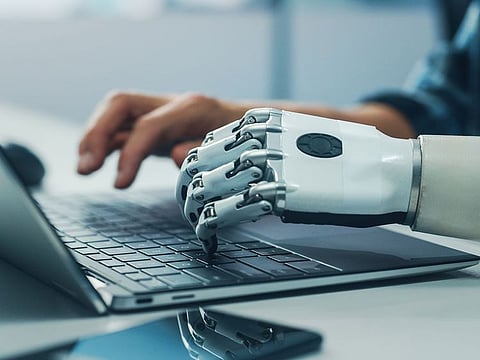Business using Gen AI must not fall for sameness in output
AI tools must be used as layers to finesse the finished product

Generative AI is a gamechanger, particularly in the Middle East where governments and businesses are embracing AI and advanced technologies. PwC projects the region to gain 2 per cent of the global AI benefits by 2030, amounting to $320 billion.
While AI's impact on jobs is debated, it's clear it's here to stay. Businesses must integrate AI sustainably, effectively, and ethically to remain competitive. But how do they start?
Retain as much originality as possible
When reviewing reference materials from briefs and RFPs, all AI-generated visual content tends to have a similar look and feel. This is likely because all imagery comes from the same pool of references, leaving most visuals to have a common flavor.
This is something we actively try to avoid, iterating until we get (ironically) images that ‘do not feel like MidJourney’ and editing them to make sure that our thinking is original, fresh and has a unique touch.
These tools should be used as layers rather than the finished product, allowing creatives to worry more about the key objects in focus rather than the background - merging artificially generated visuals with more traditional CGI and sketches, creating a stylized approach that can be repeated.
Use AI to save time, but not replace thinking time
Some AI tools are great from an execution point of view. But if there’s no core creative concept that ties everything together, it just becomes a myriad of impressive-looking visuals without any substance.
There’s (currently) no replacement for fresh, original thinking and ideas - from brainstorming sessions, iterations and trial-and-error, to just the good old-fashioned way of waiting for a ‘spark’ that offers a solution.
AI can generate some ‘out there’ stimuli, but it can’t (as yet) replace the human ability to discern nuance and bias. It’s an aid, not a replacement, for the very human art of thinking and creativity.
Perhaps, most importantly, the process of collaboratively finding a solution to a design or creative problem together as a team, in the same physical or virtual space, is still irreplaceable. Developing a better creative solution than AI tools ever could by themselves.
Beware of the limitations
When you design in three dimensions - it’s essential to be able to rotate, spin, zoom out, zoom in and perform a million other movements - which are (again, currently) not available in generative AI-powered tools.
If a scene needs to go from day to night - you will get a very different output from, for instance, MidJourney, or if you need to make a furniture adjustment requested by the client, or if a certain space needs to be reduced by half |(or…).
You get the point - AI-powered output is great as a wrapper of sorts, but the internal machinations and functioning of experiences are still very much in the hands of creative agencies and production companies.
Ownership, ethics and job displacement
There are many open-ended questions regarding the use of these new tools in our everyday - regarding artistic protection for talents that are not being remunerated for their influence in these processes, the ethics of generating content and selling it as original, and the place of up-and-coming designers and creatives in a world where entry-level tasks are being automated.
Throughout it all, though, we believe the most important aspect is to remain true to ourselves. Carefully but confidently stepping into the unknown while maintaining teams that are equipped, curious, and agile - ready for any new potential developments.
We have mapped our Approach to using Generative AI designed to support an experimental, share and learn approach within Generative AI to extend our creativity, whilst prioritising confidentiality, transparency, fairness and removing bias.
In a world where change is the only constant, being unapologetically ourselves may be the most challenging task of all.








